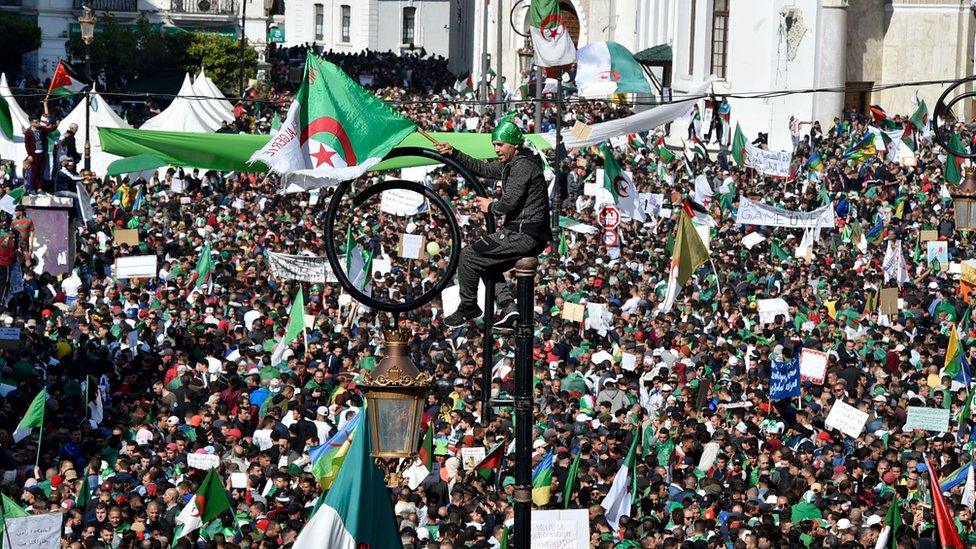Algeria: Hundreds of thousands march for President Bouteflika's removal
- Published
Police used water cannon during the protest in Algiers
Hundreds of thousands of people have taken to the streets in Algeria to demand the resignation of President Abdelaziz Bouteflika.
Estimates say crowds in the capital, Algiers, reached a million. It is the sixth successive Friday of mass anti-government protests in the country.
Earlier this week an army general, Lt Gen Ahmed Gaed Salah, called for the position of president to made vacant.
But opposition parties in Algeria said it would not guarantee free elections.
Algerian police fired tear gas at crowds as they attempted to reach the presidency, the BBC's Mohamed Arezki Himeur, in Algiers, said.
The renewed calls for regime change come just days after Lt Gen Gaed Salah demanded that Mr Bouteflika be declared unfit to rule.
What do the protesters want?
Demonstrations against Mr Bouteflika began last month after the president, who has seldom been seen in public since suffering a stroke in 2013, announced that he would stand for another term.
In response, the president agreed to not stand for a fifth term in upcoming elections, which have been delayed.
However the move did not go down well with protesters, who said his decision not to run was a cynical move to prolong his 20-year rule.

Some estimates say as many as a million people marched in the capital, Algiers
They are now calling for the departure of the president and also an entire generation of Algerian political leaders, including those who would be in line to succeed him.
At the protest in Algiers, one member of the crowd, named as Ali, told Reuters news agency: "We only have one word to say today, all the gang must go immediately, game over."
What happens now?
Lt Gen Gaed Salah - who is also deputy defence minister and seen as loyal to Mr Bouteflika - this week called for the use of Article 102, which allows the Constitutional Council to declare the position of president vacant if the leader is unfit to rule.
The ruling party, the National Liberation Front (FLN), backed the general's call.
Under the constitution, the head of the Senate, Abdelkhader Bansallah, would become the acting head of state until an election could be held.
Despite the significant intervention, the call from the army chief of staff does not appear to be enough for protesters and opposition parties, who have continued to protest on the streets.

Opposition unimpressed
By Ahmed Rouaba, BBC Africa
Opposition parties and protesters in Algeria were not impressed by the suggestion of Lt Gen Gaid Salah to trigger Article 102 of the constitution.
The majority of protesters are youth who are not involved in party politics and who say they are not interested in the departure of Mr Bouteflika only to see the power transferred to his former allies - bringing to power different faces of the same regime.
It is difficult to predict what is going to happen because there is no indication that opposition parties hold any influence over the protesters, who do not have any leader or spokesperson who could hold talks with the authorities.
The army clearly wanted to see an end to the crisis when they abandoned Mr Bouteflika in an unexpected move. But they need to find an influential party to discuss the procedure with.
For the moment, the protesters' expectations are very high as they demand the departure of "everybody who has been associated with the regime", but they do not offer an alternative.
Lt Gen Gaid Salah had already dismissed the idea of "removing everybody" as expressed in the protests and on social media.

Who could succeed Algeria's president?
Said Bouteflika: Many in Algeria believe the president's younger brother is the de facto ruler of the country. He is described as being the president's gatekeeper, leading the presidential clan and protecting its interests from behind the scenes.
Lakhdar Brahimi: One of the country's most respected veteran diplomats, Mr Brahimi had a successful career at the highest level in the UN General Secretariat. When protests in Algeria first began, Mr Brahimi was chosen to head a transitional conference on the country's political future.
Ali Benflis: The founder of the state-run Algerian League for Human Rights was appointed minister for justice in 1988. He was named prime minister in 2000 but dismissed in 2003. He is considered a possible successor despite losing presidential bids in 2004 and 2014.
Ali Haddad: The former head of Algeria's Business Forum was identified by Algerian and French press as being one of the main financiers of Mr Bouteflika's 2014 re-election campaign.
Ahmed Gaid Salah: The army chief of staff has created controversy by commenting on public matters, leading many to believe that he has presidential ambitions. The Lt Gen has also frequently helped Mr Bouteflika undermine the position of other generals.
